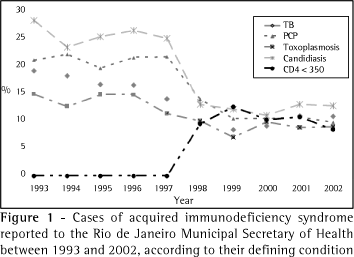OBJECTIVE: To analyze the frequency of tuberculosis and of the other principal opportunistic infections defining acquired immunodeficiency syndrome at the time such cases were reported in the city of Rio de Janeiro, Brazil. METHODS: Analysis of the data compiled in the Rio de Janeiro Municipal Program for the Surveillance of Sexually Transmitted Diseases and Acquired Immunodeficiency Syndrome database from 1993 to 2002. RESULTS: The expanded definition of a case of acquired immunodeficiency syndrome, implemented in 1998, resulted in a substantial increase in the number of reported cases of acquired immunodeficiency syndrome, especially of those defined by immunologic criteria. Among the cases of acquired immunodeficiency syndrome defined only by disease, esophageal candidiasis, in its various forms, remained the most common opportunistic infection present at the time the cases of acquired immunodeficiency syndrome were reported. Although Pneumocystis carinii pneumonia was the second leading opportunistic infection in most of the years evaluated, it was surpassed by tuberculosis in 2001. CONCLUSION: Despite the decreased numbers of cases of acquired immunodeficiency syndrome defined by disease, tuberculosis remains a significant acquired immunodeficiency syndrome-defining event, currently more common than P. carinii pneumonia and toxoplasmosis. This is probably due to the high rate of tuberculosis prevalence in the city.
Tuberculosis; Acquired immunodeficiency syndrome; AIDS-related opportunistic infections





